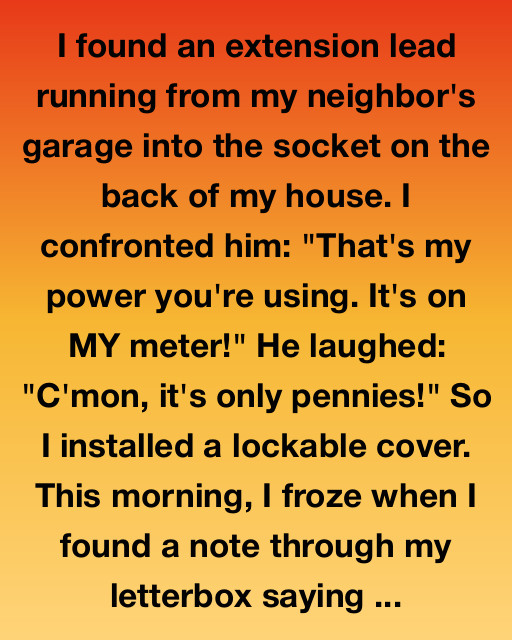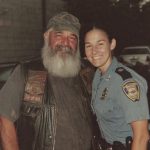I found the orange cord first—snaking from Ron’s garage, across the fence line, plugged into the outdoor socket on the back of my house.
I marched over. “That’s my power you’re using. It’s on my meter.”
He leaned in the doorway, grease on his hands, and laughed. “C’mon, it’s only pennies, mate.”
I bought a lockable cover that afternoon and screwed it down like a padlock on a diary. Felt justified. Felt… tidy.
The next morning a note slid through my letterbox: You’re colder than your electricity, mate.
I stood there with toast in one hand, the note in the other, and something ugly stirred—anger first, then defensiveness, and underneath, a small, annoying pinch of guilt.
We used to be friendly, me and Ron. Summers with shared barbecue tools, the occasional mower swap. Then Maureen died and his world folded itself into that dim garage. I’d tried—soup, pies, a knock on the door—but he never let me in, not really.
That night his place stayed dark. No glow through the frosted window, no tinny radio. A bad silence.
I went over. Knocked. Called his name. Nothing.
Through the little glass I caught a shape on the floor.
Fence. Door. 999 on speaker. He was breathing—shallow, sticky-sounding breaths—but couldn’t answer me. The paramedics said diabetes, likely a hypoglycemic episode. No food in the fridge, no money, power cut off. The cord hadn’t been cheek—just survival.
“If you hadn’t found him…” one medic started and didn’t finish.
I sat at home with the TV off and the note on my lap, feeling like I’d locked more than a socket.
When he got out of hospital I took groceries, a small heater. He looked smaller in his chair.
“I’m sorry,” I blurted.
“For what?” he said, genuinely puzzled.
“For not asking.”
He tilted his head, that old mechanic’s half smile. “Not your job to ask, mate.”
“No,” I said. “But I should’ve anyway.”
We started over. I called the energy company; we set up a payment plan. A mate of mine patched his garage roof. Someone from up the street dropped off blankets. The electrician two doors down fitted LEDs. Funny thing—once one person steps forward, the rest of the street remembers how.
Ron brightened. He fixed a neighbor’s lawnmower, tuned a kid’s scooter so it flew straight. The crackle came back to his radio and to his laugh.
A month later he knocked, grinning. “Need your socket again.”
“Do you, now?”
“Just today. Big surprise.”
That evening, in the center of my lawn, sat a bench he’d built from offcuts—birds carved into the arms, smooth as river stones. A little brass plaque read: The Cord Between Us.
“You’re impossible,” I told him.
He tapped the plaque. “You thought the cord was about nicking electricity. Maybe it was about something else.”
We sat. We watched the sky go the color of tea. The plastic cover on my socket stayed locked; the thing it guarded didn’t.
Word got around. Ron started volunteering at a community repair shop. He fixed fans and radios for families who couldn’t afford new ones. People brought him jam and stories. Once, he showed me a letter from a woman who said he reminded her of her late dad—the way he handled broken things like they were worth fixing.
Eventually, he said he’d move to a smaller place closer to town. “More people. Less quiet.” We boxed up his life. On the last day we took the bench again and sat.
“That note,” he said. “Half a joke. Half… I hoped you’d come over and bollock me so we could talk.”
“Well,” I said, “you got me.”
He squeezed my shoulder. “Thanks for plugging back in.”
He left the bench. It stayed on my grass like a story you can sit on. Neighbors asked; I told them. Some laughed. Some wiped at their eyes. Everyone got it.
About a year later a small parcel arrived—no return address. Inside, a wooden carving: two little houses side by side, a wire carved between them. On the back, burned into the grain: It’s not the power you share. It’s the warmth.
Now it sits on my windowsill. A nudge to look up, to notice dark windows, to knock. To remember that “only pennies” can mean “only hope” when someone’s down to counting both.
We imagine reconnection needs grand gestures. Most days it’s smaller: a question instead of a judgment, a socket unlocked, a seat on a bench.
Sometimes the best current we pass along isn’t electricity at all. It’s care.
If this sparked something—made you think of someone to check on—share it. Your knock might be the one that matters today.


